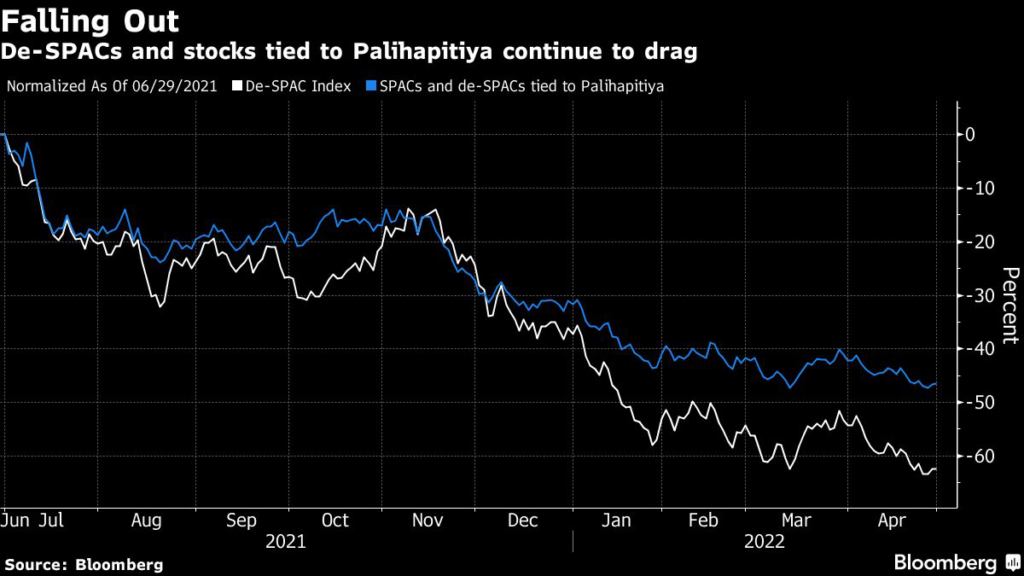(Bloomberg) — The SPAC world’s rebound didn’t last long. After posting small gains throughout late winter, stocks of companies bought by blank-check firms plunged once again in April, including some created by the “SPAC King” himself, Chamath Palihapitiya.
Each of the four companies that merged with special-purpose acquisition companies led by Palihapitiya dropped at least 15% in the month. In some cases, such as Clover Health Investments Corp. and SoFi Technologies Inc., losses for the month were even bigger. All told, a benchmark index for SPACs that completed mergers is down more than 70% since peaking in February 2021.
The tumble has driven dealmakers to pull the plug on new SPAC offerings. A record 21 listings that would’ve raised a combined $6.9 billion were pulled in April, data compiled by Bloomberg show. That leaves 165 SPACs still waiting to go public, while more than 600 already in existence are scavenging for targets ahead of deadlines that would force them to shut down.
A representative for Palihapitiya declined to comment, but pointed to the broad fallout for regular IPOs that has been similar to so-called de-SPACs. Blank checks tied to Palihapitiya that have yet to close deals have outperformed the market, benefiting from rules that cut risk by requiring SPACs to hold their cash in trust until they complete a merger.
Separate teams led by experienced dealmakers such as Navigation Capital Partners’ Larry Mock and David Panton now say in filings this month they won’t proceed with previous plans for new SPACs. Navigation already has ties to six existing blank checks hunting for mergers.
“There’s just a natural overhang of a multitude of SPACs created in 2021 that we didn’t see any reason to go from six to 10 in the market,” Mock said in an interview.
Called Off
Collectively, at least 62 SPACs with ambitions to raise more than $17 billion have been called off this year. That’s more than the $10.6 billion that new SPACs have raised.
Even if sponsors could do an IPO, the market losses for companies that merged with SPACs might scare off any prospective partners. SPACs are called blank checks because they raise cash from investors through a public offering with the goal of buying a private business in the future. If they don’t complete a deal within a set timespan, they have to liquidate.
“I don’t think the high-quality companies are going to consider a SPAC anymore, which makes it almost impossible for a SPAC to get a deal done these days,” Rainmaker Securities managing director Greg Martin said. “We’ll probably see a lot of liquidations in the back half of this year and the start of next year.”
SPAC liquidations, which require the firms to return the cash raised to investors, are already popping up. Three blank-check companies announced this month that they’re giving up after they weren’t able to find a suitable business to buy.
There are more than 700 active SPACs either looking for deals or on pace to complete them with a combined $188 billion in trust, according to data from SPAC Research. The market remains oversaturated with the initial buzz having worn off, said Anderson Lafontant, a senior adviser at Miracle Mile Advisors.
“A lot of the prime candidates to merge with SPACs have already merged,” she said. “And the amount of SPACs created over the last two years has greatly outnumbered the number of quality private companies available for acquisition.”
SPAC Skeptics
To be fair, the window for traditional initial public offerings has been shut and some U.S. stock benchmarks are mired in a brutal correction. The tech-heavy Nasdaq 100 Index is down about 19% this year, while the Russell 2000 Index, which shares similarities to many de-SPACs, has dropped 15%.
Investors have grown increasingly skeptical of the SPAC industry with gauges trading near record lows as U.S. regulators clamp down on the industry and key players step to the sidelines.
The De-SPAC Index, which tracks 25 companies that have gone public through a merger with a SPAC, is down another 18% in April. The IPOX SPAC Index, which includes blank checks that are still looking for something to buy, is down 44% since the February 2021 peak and 5.9% in April.
More stories like this are available on bloomberg.com
©2022 Bloomberg L.P.











